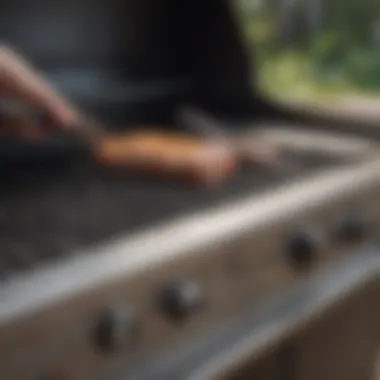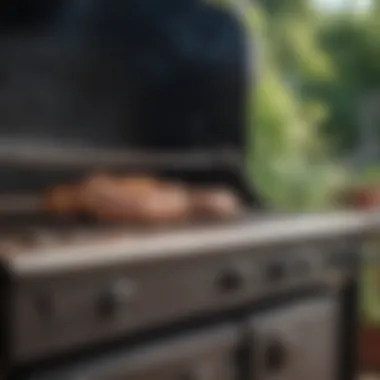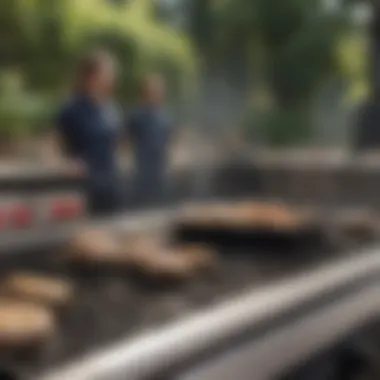Innovative Grill Cleaning Techniques for Longevity


Intro
Grilling is not just a cooking method; it is a culinary art that demands attention and care. Regular maintenance ensures that grills perform optimally, enhancing both flavor and safety. This guide offers a detailed exploration of new innovative techniques for cleaning your grill. The goal is to provide homeowners and grilling enthusiasts with practical methods and eco-friendly solutions that can elongate the life of their equipment.
Understanding the significance of grill cleaning techniques is essential. A clean grill not only provides safer cooking but also contributes to better tasting food. Moreover, improper cleaning can lead to residue buildup, which can affect results and even cause health concerns. This guide will delve into various aspects surrounding grill care, exploring modern techniques, tools, and environmental implications of different cleaning solutions.
Understanding Grill Cleaning
Grill cleaning is a critical aspect of maintaining not just the equipment but also the quality of food prepared on it. It involves the removal of grease, food particles, and other debris that can accumulate over time. The necessity for cleaning arises primarily from concerns over hygiene and cooking performance. The buildup of contaminants can affect the grill’s efficiency and the flavor of the food. Regular maintenance of grills is more than a task; it is an integral part of ensuring a safe cooking environment.
The Importance of Regular Cleaning
Regular cleaning of the grill is essential for several reasons. First, it hinders the growth of bacteria. When food residue clings to the grates or inside components, it creates a breeding ground for harmful bacteria. This is especially significant for those who cook meat and fish, which can harbor organisms that lead to foodborne illnesses. By practicing routine cleaning, one can mitigate health risks associated with bacteria.
Additionally, cleaning enhances the grill’s lifespan. When dirt and grease are allowed to build up, they can cause rust and corrosion. This deterioration can lead to costly repairs or early replacement of the equipment. Another key aspect is the improvement of cooking performance. A clean grill heats evenly, allowing for better browning and more flavorful food.
In summary, frequently cleaning the grill not only promotes hygiene but also boosts its functionality and lifespan. The overall benefits justify the time spent on maintenance, ensuring that grilling remains an enjoyable and safe activity.
Common Grill Contaminants and Their Effects
Grills are exposed to various contaminants that affect their operation and the safety of food. The most prevalent include:
- Grease: A primary issue, grease collects from the cooking process and can ignite, leading to flare-ups. It also creates off-flavors in food if not cleaned regularly.
- Food Particles: Leftover bits from previous meals can also attract pests and promote unwanted bacteria growth. They can contribute to poor taste and texture in subsequent meals if not dealt with.
- Charcoal Ash: For charcoal grills, ash can inhibit airflow, which is vital for heat generation.
Each of these contaminants serves to compromise the grill's efficiency and the taste of cooked items. Untreated residue accumulating within a grill poses both a health risk and a critical maintenance issue. Understanding what these contaminants are is the first step to better grilling practices.
Types of Grills and Their Cleaning Needs
Understanding the unique cleaning requirements of various grill types is crucial for maintaining both their performance and longevity. Different types of grills—charcoal, gas, and electric—each have distinctive characteristics that dictate their cleaning methods. Recognizing these needs allows homeowners to adopt the most effective cleaning techniques tailored to their grill type. This not only enhances cooking efficiency but also prolongs the lifespan of the grill.
Charcoal Grills
Charcoal grills have been a traditional favorite among barbeque enthusiasts. Their cleaning needs revolve primarily around ash removal and grease elimination. After every grilling session, it is important to let the grill cool down completely before starting the cleaning process. Once cooled, you can remove the ashes using a grill brush designed for charcoal models, or a small shovel if necessary. If ash is allowed to accumulate, it can impede airflow, affecting the grill's ability to maintain consistent temperatures during cooking.
Regularly cleaning the grates and removing any remaining food residue enhances food flavor and protects the grill from rust and corrosion. You should also check for grease build-up around the bottom of the grill, as it can be a fire hazard. Cleaning charcoal grills might require a bit more effort compared to others, but the reward is often well worth it in terms of enhanced flavor and cooking performance.
Gas Grills
Gas grills offer convenience and ease of use. They tend to require less labor-intensive cleaning compared to their charcoal counterparts. However, they still need regular maintenance. The first step is to ensure the grill is off and cool before starting. Remove the grates and clean them with a brush to eliminate food particles and grease. A specialized grill cleaner can be effective for this task, simplifying the process.
Another key component of gas grill cleaning involves the burners. Debris can obstruct burner ports, leading to uneven heating. It is advisable to follow the manufacturer’s guidelines for cleaning the burners. Regularly checking the flame and adjusting as necessary ensures optimal cooking efficiency. Keeping the exterior of the grill clean is also important for aesthetics and longevity. A simple wipe down with a mild detergent will keep it looking fresh.
Electric Grills
Electric grills provide a modern and user-friendly grilling experience. They require specific cleaning practices to maintain their functionality. Once the grill is turned off and has cooled, you should remove the plates and immerse them in warm, soapy water. This can help dislodge stubborn food residues.
An often-overlooked aspect is to check the drip tray. Keeping the drip tray clean is essential to avoid excess grease accumulation, which could pose fire risks. For the grill's surface, a soft cloth or sponge can be used to wipe it clean without scratching. While electric grills do not generally accumulate debris like gas or charcoal grills, maintaining cleanliness directly affects performance.
Modern Cleaning Tools and Technologies


The advancement in cleaning tools and technologies has profoundly affected how grill maintenance is perceived and executed. With an increasing emphasis on efficiency and effectiveness, modern tools deliver improved results with less effort. These cleaning innovations solve common problems faced by grill owners. Understanding how to utilize these tools can enhance cleaning practices, prolong the lifespan of grilling equipment, and improve cooking performance.
Innovative Brushes and Scrapers
Various innovative brushes and scrapers have emerged in the market. Unlike traditional options, many of these modern brushes feature materials that prevent rust and deterioration. Stainless steel bristles and heavy-duty nylon brushes are great examples. In addition, some brushes now come with built-in scrapers. This dual-functionality allows for easy removal of stubborn debris without the need for multiple tools.
When choosing a brush, consider the grill type. Some brushes are designed specifically for cast iron grates, while others work well with stainless steel models. This specificity ensures that the surface is not scratched and maintains its performance. Furthermore, ergonomic designs enhance user comfort during the cleaning process, making these brushes more appealing for regular use.
"Using the right brush can mean the difference between an effective clean and unseen residue that can affect the next cookout's flavor."
Steam Cleaning Solutions
Steam cleaning has gained attention as a highly effective yet gentle method for grill cleaning. This technology utilizes hot steam to dislodge grease and grime without the use of harsh chemicals. It reduces labor intensity while ensuring cleanliness. Steam cleaning appliances come in various sizes, from handheld units to more extensive systems designed for heavy-duty tasks.
An important benefit is that steam, working at high temperatures, can sanitize surfaces. Thus, it not only cleans but also helps in maintaining a hygienic cooking environment. Particularly for individuals concerned about chemical residues, steam cleaning offers a non-toxic alternative. However, while using this method, safety precautions must be followed, ensuring the steam is handled correctly to avoid burns.
Chemical-Free Alternatives
In an era focused on sustainability, chemical-free cleaning alternatives are increasingly in demand. Many grill owners seek to minimize their environmental impact. Options are available including cleaning pastes made from natural ingredients like baking soda and vinegar. These substances can effectively break down grease and grime while being safe for the environment.
Moreover, some companies now produce grill cleaning sprays that use plant-based ingredients. These sprays can clean surfaces without leaving harmful residues, making them suitable for grilling enthusiasts concerned about health and safety.
It is essential to research and select eco-friendly products that have proven effectiveness. Reading reviews or consulting with other grill owners can provide insights into the best options available on the market today.
By embracing modern cleaning tools and technologies, grill owners can significantly enhance their cleaning routines. Innovations like specialized brushes, steam cleaning, and chemical-free alternatives create a comprehensive approach to maintaining grills while considering the health of both users and the environment.
Step-by-Step Cleaning Process
The step-by-step cleaning process is crucial for maintaining your grill’s performance and ensuring a safe cooking environment. By following a systematic approach, you can address various areas of the grill that often accumulate grease and residue, which can affect food flavor and safety. Moreover, a thorough cleaning enhances durability and prolongs the lifespan of your grill.
Pre-Cleaning Considerations
Before diving into cleaning your grill, certain preparations are necessary. First, make sure the grill is completely cool. Cleaning a hot grill can lead to burns and is unsafe. Next, gather all necessary tools, such as brushes, scrapers, and cloths. It is also beneficial to assess your grill type—whether it’s gas, charcoal, or electric—as this can dictate specific cleaning methods and precautions.
Tip: Proper ventilation is essential. Ensure you’re working in a well-ventilated area, especially when using chemical cleaning products.
Disassembling the Grill
Disassembling the grill is a significant step in ensuring each component gets the attention it needs. For gas grills, you should disconnect the propane tank or gas line to eliminate any risk. Remove the grates and any other removable parts such as burners or heat shields. For charcoal grills, dispose of the old charcoal and ash. This not only makes cleaning easier but also allows you to inspect each part for excessive wear or damage.
Cleaning the Grates
The grates are one of the most vital areas to clean, as they come in direct contact with food. Start by brushing them with a grill brush to remove food particles and grease. If stubborn residue remains, consider soaking them in warm, soapy water before scrubbing. For a deeper clean, some recommend vinegar and baking soda. This natural solution can remove char marks effectively, enhancing the grilling surface.
Cleaning the Interior
The interior of the grill often gathers grease and carbon buildup. Start by using a putty knife or scraper to gently scrape off residue from the walls and bottom of the grill. If using gas, do not forget to clean the burner tubes, ensuring no obstructions are present. Wiping down the surfaces with a cloth dampened in warm, soapy water can help remove any lingering grease. For charcoal grills, vacuuming ash from the base and cleaning the interior components is essential.
Cleaning the Exterior


The exterior of the grill is not just for aesthetics; it also needs care to prevent rust and maintain the surface. Use a mild soap solution with a soft sponge to wipe down the metal surfaces. Pay attention to knobs, handles, and any painted areas, as these can accumulate grime. Rinse properly with water to prevent soap residue.
Regularly inspecting and cleaning all parts of your grill will help maintain its appearance and functionality. Engaging in this step-by-step cleaning process allows grill enthusiasts to enjoy many successful and safe grilling experiences.
Best Practices for Grill Maintenance
Maintaining a grill is essential not just for cleanliness, but also for performance and longevity. Adopting good practices helps prevent damage and ensures that your grill operates efficiently. By adhering to a set routine, grill owners can minimize repairs and maintain the quality of their cooking.
Routine Cleaning Schedule
Establishing a routine cleaning schedule is crucial in grill maintenance. Regular cleaning keeps your grill free from grease buildup and food residue that can lead to bad flavors and smoke production during cooking. Ideally, you should clean your grill after every use. This simple practice involves using a grill brush to remove food debris from grates while they are still warm. Also, wipe down surfaces with a damp cloth to keep them clean and hygienic.
Consider a weekly or bi-weekly cleaning, depending on how often you use the grill. This can include more thorough cleaning of the grates and interior components. A clean grill is safer as it reduces fire hazards and improves your food’s taste.
Seasonal Deep Cleaning
At least twice a year, your grill deserves a deeper clean beyond the routine maintenance. Seasonal deep cleaning allows you to address issues that may be overlooked during normal cleanings. Start by ensuring the grill is completely cool and disconnected from any fuel sources. Remove the grates and use a cleaning solution to scrub them thoroughly.
While you are at it, do not forget to inspect the burners and the interior for any signs of rust or wear. Replace parts that are badly damaged as they can impact performance. A deep clean creates a more enjoyable cooking experience and helps prolong the lifespan of your grill.
Storage and Protection
How you store your grill can greatly affect its condition over time. If you do not plan to use your grill for an extended period, it is wise to cover it with a protective grill cover designed for your specific model. This help prevent rust, and damage from weather elements such as rain and snow.
Before storing the grill, ensure it is clean and all components are dry. Additionally, consider storing it in a dry location if possible. Keeping the grill protected from environmental factors can save you future costs in repairs or replacements.
Regular maintenance is key for a grill’s performance and longevity.
Environmental Considerations
Environmental considerations play a significant role in grill cleaning methods. As society becomes increasingly aware of the impact of our choices on the planet, it is crucial to recognize how traditional cleaning methods affect the environment and explore more sustainable alternatives. The cleaning products and techniques we use can contribute to pollution and waste. Additionally, the disposal of these products can have long-term consequences on ecosystems.
As grilling enthusiasts, we have a responsibility to choose products and cleaning practices that minimize harm. Understanding the environmental footprint of various grill cleaning methods can lead to more informed choices.
Impact of Traditional Cleaning Products
Traditional cleaning products often contain harsh chemicals that can be detrimental to both our health and the environment. Many commercial grill cleaners are laden with toxic substances that can cause water pollution when they enter the drainage system. Ingesting residue left on grilling surfaces can pose health risks.
Some common traditional cleaning products include:
- Chemical spray cleaners: Usually contain corrosive substances that may damage grill components over time.
- Solvents: These can evaporate quickly but release volatile organic compounds (VOCs), contributing to air pollution.
- Heavy-duty scrubbers: Often made from synthetic materials that do not degrade, contributing to landfill waste.
Using these products can raise environmental concerns. It’s important to be aware of their ingredients and impacts. Consider using eco-friendly alternatives to reduce this impact.
Sustainable Cleaning Practices
Transitioning to sustainable cleaning practices can significantly reduce your environmental footprint. Options like using biodegradable or non-toxic products can help maintain grill performance without harming the planet.
Some effective sustainable practices include:


- Homemade cleaners: Simple mixtures of vinegar and baking soda can effectively clean grill surfaces without harsh chemicals.
- Natural brushes: Opting for brushes with bamboo handles or natural fibers helps reduce plastic waste.
- Recycled materials: Using old newspaper or cloths reduces new waste and effectively cleans greasy surfaces.
By adopting these sustainable cleaning techniques, grill enthusiasts can achieve cleanliness without compromising the environment. Small changes can lead to significant benefits, enhancing both grilling experiences and environmental stewardship.
Choosing eco-friendly cleaning solutions not only protects our planet but also ensures a safer cooking environment for your family.
Troubleshooting Common Grill Problems
Effective grill maintenance goes beyond just cleaning. Addressing common grill problems ensures that your grilling experience is optimal. Troubleshooting is important because it allows you to identify and fix issues before they escalate. This provides a safer cooking environment and enhances the performance of your grill. Problems like uneven heating, flare-ups, and rust can seriously affect your grilling results. By understanding these common issues, homeowners can maintain their grills better and enjoy their outdoor cooking activities.
Uneven Heating Issues
Uneven heating is a frequent concern for many grill users. It can cause uneven cooking, leading to food that is either undercooked or overly charred. This problem often arises from blockages in the burners or insufficient airflow. It might also occur if the grill grates are not properly arranged.
To troubleshoot uneven heating, first, ensure that all burners are functioning properly. Inspect them for any clogs or blockages that may disrupt the gas flow. If you have a gas grill, cleaning your burners periodically is crucial. You can also check the burner alignment. Proper alignment helps in distributing the heat evenly.
Additionally, consider the placement of your food on the grill. Placing larger pieces of meat close to hotter zones will ensure more even cooking. Rotating items on the grill throughout the cooking process can also help.
Flare-Ups and Smoke Issues
Flare-ups are common and can be a source of frustration for many grillers. They occur when fat drips onto the heat source, leading to sudden bursts of flames. While some grilling enthusiasts welcome flare-ups for added flavor, frequent and uncontrolled flare-ups can lead to burnt food.
To manage this problem, reduce the temperature on your grill if you notice flare-ups. Adjusting the cooking position of fatty cuts of meat can also help. For gas grills, you can turn off specific burners to moderate the heat distribution. Another effective method is using a drip pan to collect excess fat and prevent flare-ups before they start.
Also, ensure that the grill surfaces are clean. Accumulated grease is often the primary cause of smoking issues. Regularly cleaning the grates and the interior of the grill is necessary for preventing both smoke and flare-ups.
Rust and Corrosion Prevention
Rust and corrosion can significantly shorten the lifespan of your grill. It not only impacts the aesthetics but can also affect performance and safety. Understanding how to prevent these issues is vital for grill longevity.
First, apply a high-quality grill cover when the grill is not in use. This protects it from moisture and harsh weather conditions. Be mindful of where you store your grill; placing it in a sheltered area can greatly reduce rusty spots.
Regularly inspecting your grill for any signs of rust is also important. If you notice small spots, address them promptly with sandpaper or a wire brush. Applying a layer of food-safe oil to metal surfaces can create a protective barrier against rust.
Being proactive in your maintenance routine will prevent rust from developing. This vigilance ensures that your grilling equipment remains in optimal condition, giving you confidence every time you fire it up.
Closure and Recommendations
In wrapping up the exploration of innovative grill cleaning techniques, it becomes clear that diligent maintenance is not merely an optional practice but a necessity for successful grilling. Regular upkeep significantly impacts both the performance and longevity of your grill. This section will highlight essential takeaways and recommendations to ensure that your grilling experience remains enjoyable and productive.
Summarizing Key Cleaning Techniques
To effectively maintain your grill, it is prudent to incorporate several specific cleaning techniques:
- Regular Brushing: After each use, employ a suitable brush to remove food residues from grates. Consider using a stainless-steel brush for metal grates and a brass brush for porcelain ones.
- Deep Cleaning: On a seasonal basis, dismantle your grill for a thorough clean. Pay attention to the burner tubes and ensure they are free from clogs.
- Use of Steam: Opting for steam cleaning can greatly reduce the need for harsh chemicals. This method utilizes high-temperature water vapor to dissolve grease, making it easier to wipe away.
- Natural Cleaning Solutions: Baking soda mixed with water can serve as an effective cleaner. Apply it onto surfaces and let it sit before scrubbing.
Utilizing these techniques will not only keep your grill in prime condition but also promote better hygiene and flavor in your grilled foods.
Final Thoughts on Grill Longevity
Preserving your grill over the long term hinges upon adherence to good cleaning and maintenance practices. The benefits of regular upkeep extend beyond aesthetic appeal; they include:
- Enhanced Performance: A clean grill heats more evenly, ensuring better cooking results.
- Increased Lifespan: Regular attention reduces wear and tear, preventing costly repairs or replacements.
- Safety Considerations: Proper cleaning minimizes the risk of flare-ups associated with grease buildup.
Consider investing in quality storage covers and considering the environmental conditions your grill faces when not in use. Covered grills tend to experience less rust and maintain their functionality longer.















